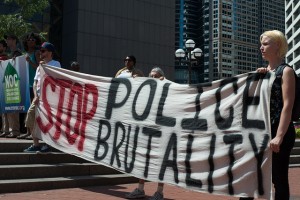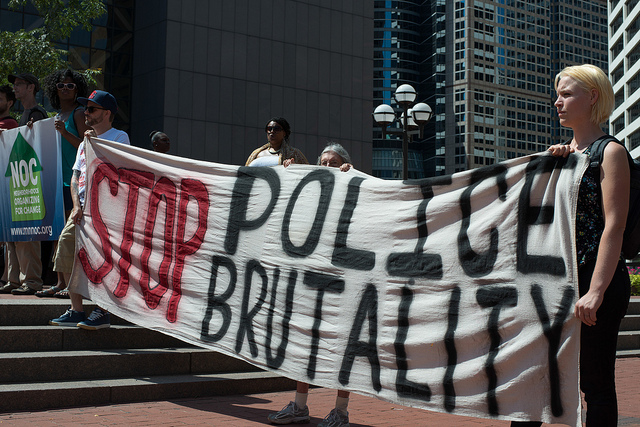Recent killings of black men by the police have brought the division between police and communities of color into national focus. As the Black Lives Matter movement intensifies, protests around the country are signaling growing outrage and calls for change, and have left many to ask, simply, “What can I do to promote a more fair and just society?”
To help answer that question, the School of Public Health’s Division of Epidemiology and Community Health hosted a conversation on Thurs., July 14, 2016, titled, “Beyond Black and Blue: Race and Policing in America.”

“I want to have these hard conversations,” said Dianne Neumark-Sztainer, professor and division head, who organized the event with Associate Professor Theresa Osypuk. “We don’t have a formal powerpoint or research results, but we want to talk about the issues and educate ourselves.”
About 100 faculty and staff attended the gathering and were asked to share their thoughts and feelings about recent events. The conversation included a panel of four members of the community: Daheia Barr-Anderson, an assistant professor at the University of Minnesota School of Kinesiology; veteran police officer Eddie Frizell; criminologist and former peace officer David Squier Jones; and Paul Robinson, former director of the James P. Shannon Leadership Institute of the Amherst H. Wilder Foundation.
For participants, feelings of frustration, anger, and sadness were abundant. “I lived through the civil rights movement,” said one participant. “It feels like nothing has changed.”
“In public health, we’re compassionate and want change,” said Barr-Anderson. “But people can be hesitant to have this conversation. We don’t want to offend anyone.”
Participants spoke of the legacy of racism, and Robinson stressed that the issues are not about one specific person or incident, but about a system that isn’t working.
Many in the group discussed their personal experiences with the police based on race. “When something’s wrong, I run to the police,” said one participant, who is white. “I have a new empathy for people who can’t run to the police because they fear them.”
Frizell, who did not speak for any Twin Cities police department, talked about how implicit bias can make its way into our law enforcement. “If an officer has had limited to no prior experience with a diverse or different population, they may lack a proper frame of reference in which to relate to a particular person or group,” says Frizell. “If confronted, they may act in one of two ways: fear or aggression. Many Twin Cities officers, who have been raised outside of the metro area, admittedly haven’t had much exposure to different races and cultures prior to joining the police force. Police need to know the community they serve to get rid of any preconceived fear and or bias.”
The group had a number of recommendations for participants to use in their lives:
- When you hear racist comments, say something. “This fight [against racism] isn’t going to end overnight,” said Barr-Anderson. “Push people to do better.”
- Help to increase community connectedness. “We have to work together to build trust,” said Frizell.
- Increase your cultural competence. “The more you know about people and their lives, the less likely you are to make snap judgements,” said Robinson.
- Be open to different points of view. “Get to know the people in your community, read different media outlets, and think about how you can widen your worldview,” said Squier Jones.
“A lot of times, it comes down to just getting to know people,” said Robinson. “We have more in common than we have different.”
“The most important piece for this event was providing space for learning and sharing different perspectives in a very caring and respectful manner,” said Neumark-Sztainer. “Through our public health community outreach, teaching, and research, we have the opportunity to have a positive impact.”

